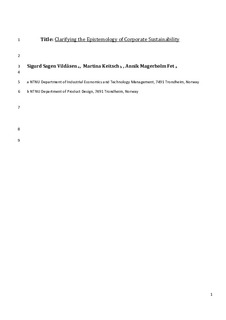| dc.contributor.author | Vildåsen, Sigurd | |
| dc.contributor.author | Keitsch, Martina | |
| dc.contributor.author | Fet, Annik Magerholm | |
| dc.date.accessioned | 2017-12-13T09:44:15Z | |
| dc.date.available | 2017-12-13T09:44:15Z | |
| dc.date.created | 2017-03-24T17:25:35Z | |
| dc.date.issued | 2017 | |
| dc.identifier.citation | Ecological Economics. 2017, 138, 40-46. | nb_NO |
| dc.identifier.issn | 0921-8009 | |
| dc.identifier.uri | http://hdl.handle.net/11250/2471062 | |
| dc.description.abstract | Business research is placing increasing focus on the relationship between the natural environment and the political concept of sustainable development. Within this nexus, one area, labelled ‘Corporate Sustainability’, emphasizes the interactions between economic, environmental and social values. The need to consider multiple values has contributed to a blur in the conceptual landscape. This is partly due to the fact that authors often address epistemological challenges on an implicit level. Moreover, hidden ideologies, e.g. the profit maximization paradigm, can explain the conceptual obscurity. The contribution of this article is twofold. Firstly, a conceptual framework is developed based on the dichotomy of positivism and constructivism. A relation is established between these epistemological positions and the analytic treatment of environmental and social values. The framework can be applied to increase transparency on epistemological challenges and thereby strengthening construct validity in the field. Secondly, an analysis of the most influential literature from the last 50 years shows that there is a trend of clustering theoretical positions and value constructs without any critical awareness of their philosophical assumptions. The authors hope that acknowledgement of a multi-paradigmatic approach can help to clarify the epistemology of the research area by establishing pluralism as an explicit position. | nb_NO |
| dc.language.iso | eng | nb_NO |
| dc.publisher | Elsevier | nb_NO |
| dc.rights | Attribution-NonCommercial-NoDerivatives 4.0 Internasjonal | * |
| dc.rights.uri | http://creativecommons.org/licenses/by-nc-nd/4.0/deed.no | * |
| dc.title | Clarifying the Epistemology of Corporate Sustainability | nb_NO |
| dc.type | Journal article | nb_NO |
| dc.type | Peer reviewed | nb_NO |
| dc.description.version | acceptedVersion | nb_NO |
| dc.source.pagenumber | 40-46 | nb_NO |
| dc.source.volume | 138 | nb_NO |
| dc.source.journal | Ecological Economics | nb_NO |
| dc.identifier.doi | 10.1016/j.ecolecon.2017.03.029 | |
| dc.identifier.cristin | 1460994 | |
| dc.relation.project | Norges forskningsråd: 236640 | nb_NO |
| dc.description.localcode | © 2017 Elsevier B.V. All rights reserved. This is the author's accepted and refereed manuscript of the article. Locked until 24 March 2019 due to copyright restrictions. Author's post-print is released with a Creative Commons Attribution Non-Commercial No Derivatives License. | nb_NO |
| cristin.unitcode | 194,60,25,0 | |
| cristin.unitcode | 194,61,45,0 | |
| cristin.unitname | Institutt for industriell økonomi og teknologiledelse | |
| cristin.unitname | Institutt for design | |
| cristin.ispublished | true | |
| cristin.fulltext | original | |
| cristin.qualitycode | 1 | |

